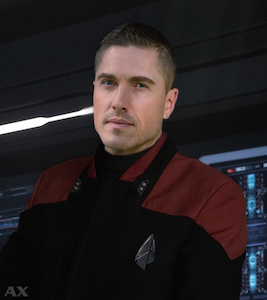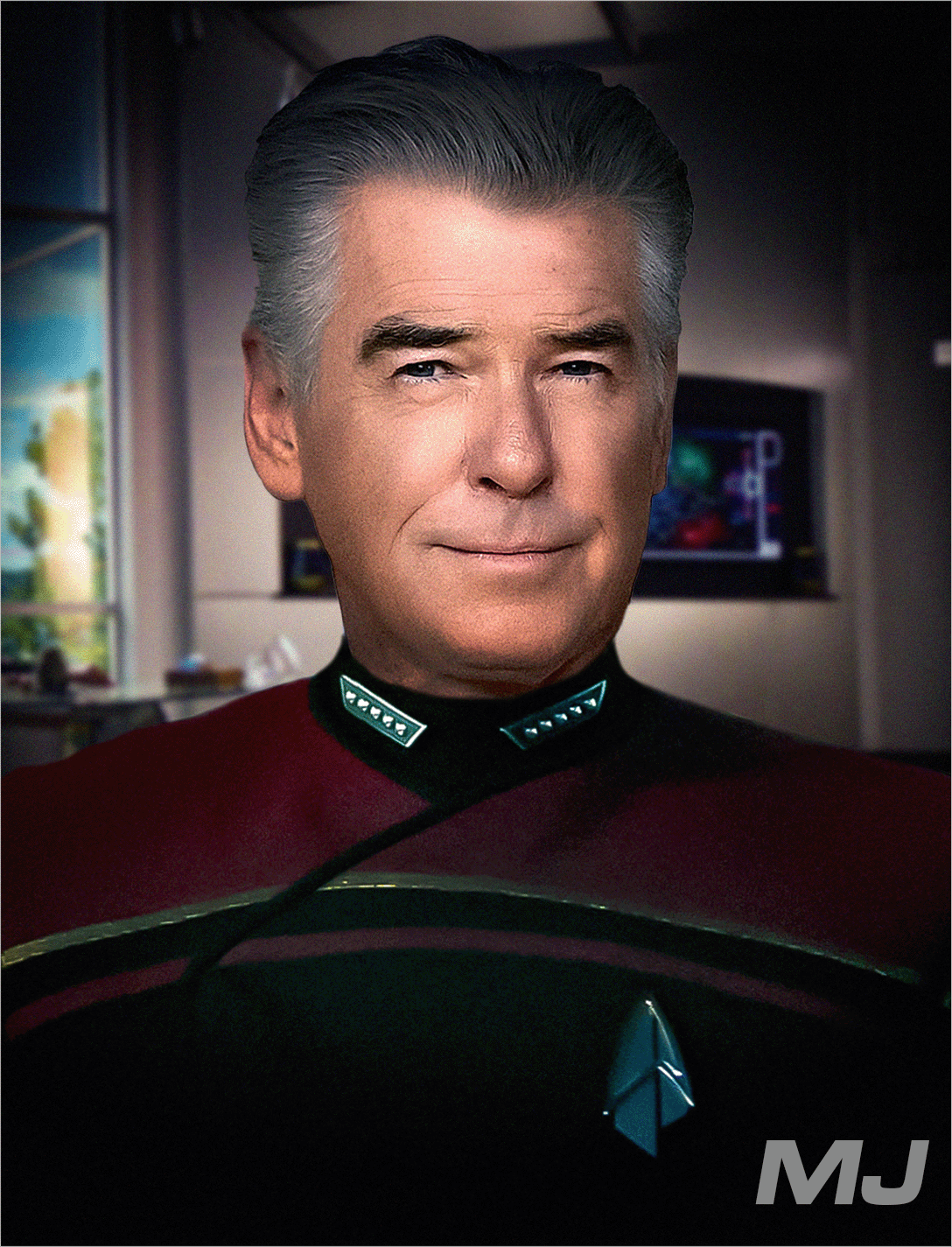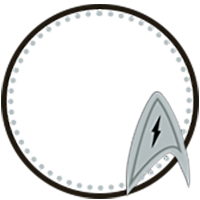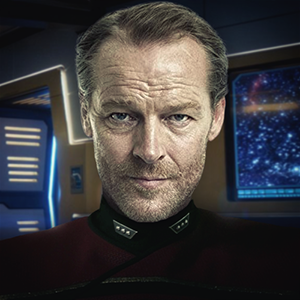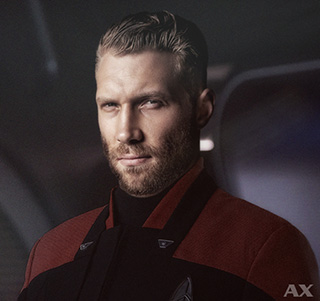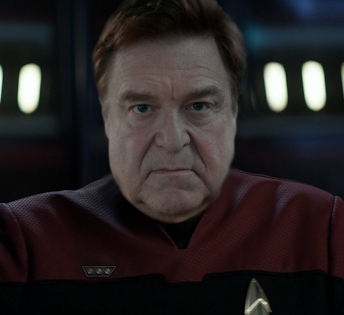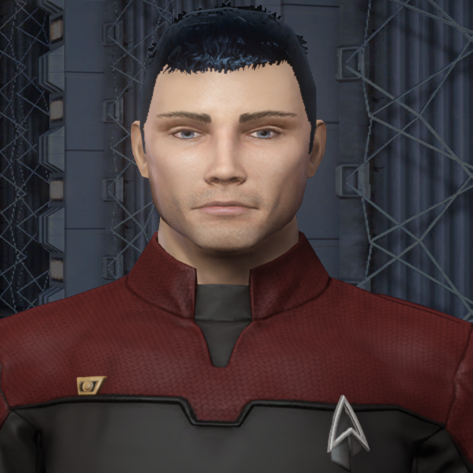‘Here she comes. Just look at her.’ The highlight of his day, Ramar thought, would be admiring the USS Edwin H. Armstrong as she gracefully glided through the docking bay doors, out of the belly of the massive Probert-class Brahms Station, and into the revelry of the formation of Fourth Fleet ships greeting her. ‘Kominek did wonders.’
‘Enterprise will be launching soon from Starbase One,’ Beckett prompted, leaning across the wide table in the observation lounge. ‘We should get the display on for Admiral Shelby’s -’
‘Of course,’ said Ramar, and immediately leaned towards Captain Gallagher, the fleet’s Engineering Officer. ‘See, he repurposed warp coils from the Sarek and the Jericho, not just the Adelphi’s original components, then integrated modern interlocks to make sure she’s got enough power for the testbed.’
‘He insists it’s sustainable,’ mused Gallagher. ‘But I’m less convinced she can stand up to the needs of some of the proposals coming out of the Avalon Group.’
‘Early days, yet – wait, did he find the exact old QSF-547-Grey hull paint?’
‘I think,’ butted in Marshall-Bennett, perhaps because Beckett looked like he was about to have kittens, ‘we should put on the feed from Sol.’
Because they had been admiring the Armstrong, they turned on Shelby’s speech only halfway through. Soon after would come the main events at Avalon itself, but Sol took precedence, as always.
It happened in that small VIP observation lounge like it did in so many places across the fleet: quickly and bafflingly. Picard’s transmission interrupting Shelby. The fleet’s confused response, disrupted by the fleet formation software going seemingly haywire.
The only reason it wasn’t worse was because, the moment he saw the ships on the feed from Sol begin to drift without the orders of their commanders, Ramar turned to his aide and said, ‘Get everyone down to R&D and pull our files on Fleet Formation; Sol looks like they’ve got a security breach.’
Marshall lifted a sharp hand. ‘Sir, we don’t even know what’s happening; we should wait a moment and see -’
Ramar ignored him, giving Deliar a sharp nod. ‘Go.’
It was a pointless endeavour. They were so far from Sol, so far from whatever was happening, that surely the answer would not be found in a dusty file in the Avalon Group’s archives. Ramar knew, even as he said it, that his orders came from a place of helplessness, a sense that he had to do something instead of simply watch.
But it meant Lieutenant Deliar and three of her staff were out of the lounge when everything at Avalon started to go wrong, too.
Beckett was on his feet the moment she’d left, eyes snapping to Ramar. ‘Sir, we should get you to a secure location.’
Dahlgren stared at him. ‘We’re in the heart of Brahms Station, Alex; where do you think the admiral should be?’
But Beckett ignored him, eyes narrowing. ‘Everything we talked about. This has to be it. I’ve made preparations -’
Ramar knew this was true. For months, Beckett had muttered about something in Starfleet Command being compromised, of the Dominion threat going deeper than merely the Lost Fleet. Information had been compartmentalised, but from what his Intelligence Officer had told him and what Ramar had seen and heard for himself, it was not merely naive willfulness that saw his superiors ignore Deneb. Something was rotten in the heart of the Federation, which meant, most galling of all, Alexander Beckett had been right to be paranoid all this time.
But not paranoid enough, it transpired, as every one of Beckett’s plans and preparations proved worthless when the yeoman who’d served him coffee cracked him in the skull with a stainless steel carafe.
In the moment, it was chaos. Ramar could only piece it all together afterwards, with the fuzziness of memory smoothing out the rough edges. The handful of young officers – reduced in number with Deliar’s departure – had been frozen in a corner, not hiding from the bickering of admirals but reeling as the Jupiter Signal reached them and the tendrils of Borg control seeped in. They’d turned on the admirals, only to show their hand with a first attack on Beckett – down like a sack of potatoes in one blow – and find the rest harder nuts to crack once the element of surprise was lost.
Three yeoman, however influenced by the Borg, armed only with serveware, were unlikely to win the first bout of hostilities against nine admirals. Not when Dahlgren could wrestle a yeoman coming at him with a tray to the deck, Mackenzie had one pinned against the desk in a heartbeat, and Ramar rose for a knock-out blow against the one who’d struck Beckett.
‘What the hell is going on?’ bellowed Dowd, rising to his feet.
On the ground, Beckett lifted an accusatory finger and groaned, ‘You.’
Ramar’s eyes whipped around to see the subject of his allegation, and raised his eyebrows at Dahlgren. ‘What’s he talking about, Liam?’
‘There was always someone in our midst.’ Beckett creaked to his feet, waving off the offer of help from Gallagher, beady eyes on the deputy fleet commander. ‘Now we’ve all been brought here, together, at Avalon, and whose idea was it?’
But Dahlgren merely stared. ‘I don’t know what you’re talking about, Alex, but this isn’t the time.’ He jabbed a finger at the display. Sol was a battleground. Avalon could not be much better.
‘He’s right,’ offered a slightly desperate Kohl. ‘We survive first, sirs.’
As grand an idea as that was, it threatened to be cut short by the doors to the lounge sliding open. Ramar rounded to see the shadowed figures of what had once been his staff, now no longer the young officers he’d known. Dark eyes fixed on him, beady against grey skin. Movements were clipped and in perfect synch as they stepped into the lounge. And when they raised the phasers they’d gathered in the time, there could be no quick thinking by the admiralty of the Fourth Fleet to save their skins.
When light enveloped Ramar, for one moment, he thought they’d opened fire. But no; he’d been shot before, and that was more darkness and pain. Perhaps it was death, though, as the chaos of the observation lounge faded before him, and into sharp relief surged the rounded chamber of a starship bridge.
Yet again, he thought it was an illusion with the grey decking and bulkheads, the light blues of the LCARS. At a glance, it could have been the bridge of the Hood or the Maryland, the ships he’d first served on a half-century ago. And where else would a fleet commander’s spirit go after death?
But an engineer’s spirit would go to an engine room, after all, and the officers at their posts all wore the double-breasted black and division coloured uniforms of the 25th century as the viewscreen showed Sol and Avalon burning.
Admiral Kominek rose from the captain’s chair. ‘Sir, do any of you need medical assistance?’
Ramar turned, blinking. Around him was the fleet’s command staff. Nowhere in sight among the grizzled bridge crew of the USS Edwin H. Armstrong was a hint of grey skin. ‘What going on, Felix?’
Leaning on Wilf Gallagher for support, glaring daggers at Dahlgren, Beckett growled, ‘Why don’t you explain, Liam…’
Beside him, Stafford looked frozen in place, staring at his heavy coffee mug. ‘Uh, Admiral?’
But it was a mere mumble, and Kominek advanced, grim-faced, as he explained. ‘Fleet formation system at Sol’s gone haywire, and here – everywhere – we’ve got junior officers manifesting Borg nanites. It’s affected only a fraction of my crew, for some reason. My first thought was to get you all out, Admiral.’
In the days to come, Ramar would realise just how fortunate it was that Admiral Felix Kominek had asked to launch the Armstrong with those who had served alongside him on the original USS Adelphi, veterans all too old to succumb to the Borg’s signal. For the moment, he didn’t look a gift horse in the mouth. ‘Avalon? Seagraves?’
Kominek shook his head. ‘Drones are seizing control centres all across the system. Sir, it’s only a matter of time before they realise I have you aboard, and we cannot let something happen to you all.’
‘We have to-’
‘Admiral!’ Stafford’s voice was now a lot clearer, but no less panicked. ‘We have another problem!’
When he raised the coffee mug he’d been transported out with, Ramar thought he’d lost his mind. Not just for some concern about his drink, but that he’d still been holding after the attacks started.
Then the mug roiled in his grip, shimmering and growing, and Ramar realised Commodore Stafford hadn’t panicked about his coffee. He’d grabbed a Changeling.
‘Security!’ bellowed Kominek, and the Armstrong bridge-crew, armed and on-edge, reacted at once. Phaser blasts hit the billowing mass even as it expanded, and while a flailing limb struck Stafford in the chest to knock him back, another bludgeoned Beckett yet again, it was over in seconds.
Kominek stared at the gooey remains seeping onto his bridge, then his eyes snapped up. ‘Helm, get us out of here. Any ship tries to intercept us, we blast our way out of here.’
On the deck, Beckett pushed himself to his hands and knees, eyes fixed on the puddle. ‘Marshall,’ he gasped. When Dahlgren offered him a hand up, he took it, too shocked to be begrudging or bashful.
‘I saw him.’ Stafford’s words came in a shudder. ‘When the fighting started, he was behind me one moment, then he was gone, he…’
‘Good job,’ said Ramar gruffly, because he wasn’t sure what else to say. ‘We’ll figure out what happened later.’ Along with, it would transpire, a thousand other things.
But for now, all they could do was run. All he could do was watch on the viewscreen as the Armstrong raced away from the chaos of Avalon, as the Fleet Yards fell under the Borg’s control step by step, as the fleet in orbit of Earth turned their force on Starbase One.
It was over in mere hours. But not by his hand; not improved, not helped, by one single act over which he had control. After a career of stepping up, of fighting the odds, of challenging, if not besting, the seeming unstoppable foes of the 24th century – from the Dominion to Mars to the Romulan Crisis – Frontier Day was to be watched. Endured. And suffered through.
Teylas Ramar had returned to Starfleet service to usher in a bright light at the dawn of the 25th century. Whatever he would do in the days, weeks, months to come – personnel reforms, security reforms, a push against a fresh desire by the Federation to hide in the face of this old threat returning – there would be no escaping the fact that on this darkest of days, all that could be done by him, by so many of them, was survive.
In Play:
- Frontier Day has ended across the Federation, the Borg plot foiled by Admiral Jean-Luc Picard and the former crew of the USS Enterprise
- Because of the Borg’s hijacking of the fleet formation software, the worst catastrophes were in the Sol System. Elsewhere, Borg took longer to seize control of ships and assets and the Jupiter Signal stopped before they could wreak serious havoc with these vessels.
- Individual ships away from Sol or Avalon have suffered varying amounts. Some were able to contain the Borg outbreak, others saw devastation among their crews. The latter is particularly true outside of the Fourth Fleet.
- In the days after, Starfleet Command will quickly uproot the Changeling infiltrators. Many of the people they replaced are found to be alive, kept prisoner on ships like the USS Intrepid.
- Likewise, Admiral Crusher will quickly ascertain how to undo the the Borg genetic modifications inflicted on Starfleet officers using the transporter system, and the risk of this crisis repeating will be abated.
- Across Starfleet, however, many, many seasoned officers have been killed by the young assimilated. Command anticipates it will take a generation to recover from this loss. In the months and years to come, many young officers will be elevated to ranking positions much earlier than expected to fill these gaps.
- While the Borg plot has been foiled and its cause identified, many young officers were assimilated and attacked or even killed their comrades. Starfleet will offer extensive psychological support for the former assimilated, but how they learn to live with what has happened will be different for each of them.

 Bravo Fleet
Bravo Fleet











